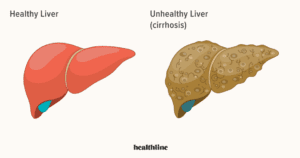Introduction:
Welcome to our comprehensive guide on liver failure. This condition occurs when the liver loses its ability to function properly, leading to severe health complications. In this article, we’ll delve into the causes, symptoms, diagnosis, and treatment options for liver failure, accompanied by real-life examples to illustrate its impact.
What is Liver Failure?
Liver failure is a critical condition characterized by the inability of the liver to perform its vital functions adequately. These functions include detoxification, metabolism of nutrients, production of proteins, and bile secretion. When the liver fails, toxins accumulate in the body, and various bodily functions are compromised, potentially leading to life-threatening consequences.

Causes of Liver Failure:
Liver failure can be caused by various factors, including:
1. Chronic Liver Diseases: Conditions such as hepatitis B and C, alcoholic liver disease, non-alcoholic fatty liver disease (NAFLD), and cirrhosis can gradually impair liver function, eventually leading to liver failure.
Example: John, a heavy drinker for many years, developed alcoholic liver disease, which progressed to liver failure despite medical interventions.
2. Acute Hepatic Injury: Sudden and severe liver damage from factors like drug toxicity, viral infections, autoimmune disorders, or ischemia can trigger acute liver failure.
Example: Sarah experienced acute liver failure after ingesting a toxic mushroom, requiring emergency medical treatment and a liver transplant.
3. Genetic Disorders: Inherited conditions like hemochromatosis, Wilson’s disease, and alpha-1 antitrypsin deficiency can predispose individuals to liver failure.
Example: David was diagnosed with Wilson’s disease, leading to copper accumulation in his liver and subsequent liver failure.
4. Cancer: Liver cancer or metastatic cancer spreading to the liver can compromise its function, causing liver failure.
Example: Lisa’s liver failure was a result of advanced liver cancer that had spread from her pancreas.
Symptoms of Liver Failure:
The signs and symptoms of liver failure may include:
– Jaundice (yellowing of the skin and eyes)
– Fatigue and weakness
– Nausea and vomiting
– Loss of appetite and weight loss
– Abdominal swelling and pain
– Confusion and cognitive impairment
– Easy bruising and bleeding tendencies
– Dark urine and pale stools
Diagnosis:
Diagnosing liver failure involves a combination of medical history review, physical examination, blood tests to assess liver function and detect specific markers, imaging studies such as ultrasound or MRI, and sometimes liver biopsy for further evaluation.
Treatment Options:
Treatment for liver failure depends on its underlying cause, severity, and individual patient factors. Options may include:
1. Medications: Certain medications can help manage symptoms and complications of liver failure, such as diuretics to reduce fluid buildup or antibiotics to prevent infections.
2. Lifestyle Changes: For chronic liver diseases like NAFLD or alcoholic liver disease, lifestyle modifications such as abstaining from alcohol, adopting a healthy diet, and exercising regularly can slow down disease progression.
3. Liver Transplant: In severe cases of liver failure where other treatments fail, a liver transplant may be necessary to replace the diseased liver with a healthy donor liver.
Example: Emma underwent a successful liver transplant after being diagnosed with end-stage liver failure due to autoimmune hepatitis.
4. Supportive Care: Patients with liver failure may require supportive measures such as nutritional support, management of complications like hepatic encephalopathy, and close monitoring in specialized medical facilities.
Conclusion:
Liver failure is a serious condition with diverse causes and potentially life-threatening consequences. Early recognition of symptoms, prompt diagnosis, and appropriate treatment interventions are crucial for improving outcomes and quality of life for affected individuals. If you or someone you know is experiencing symptoms suggestive of liver failure, seek medical attention promptly for evaluation and management.
For more information and resources on liver health, please explore our website or consult with a healthcare professional.
